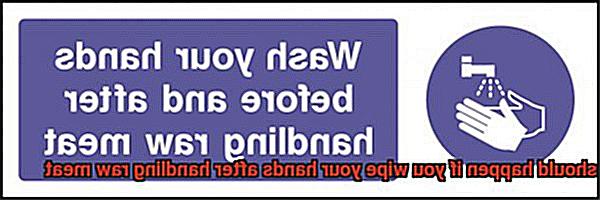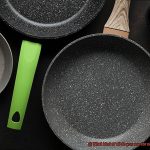Have you ever stopped to consider what could happen if you simply wipe your hands after handling raw meat? You’re not alone. Many of us are guilty of this innocent act, but it’s essential to understand the potential consequences.
Raw meat can harbor harmful bacteria such as Salmonella, E.coli, and Campylobacter. These bacteria can cause foodborne illnesses that range from mild discomfort to severe and sometimes fatal outcomes. Wiping your hands may seem like a quick fix, but it can actually make things worse.
So, what should you do instead? The answer is simple: wash your hands with soap and water for at least 20 seconds after handling raw meat. This ensures that any lingering bacteria is thoroughly removed from your hands, reducing the risk of cross-contamination.
In this blog post, we’ll delve deeper into why washing your hands is critical after handling raw meat. We’ll also provide tips on how to handle raw meat safely to prevent foodborne illnesses. Keep reading to discover why wiping your hands after handling raw meat is not enough and what steps you need to take for optimal cleanliness and health.
Contents
The Importance of Proper Hand Hygiene
Proper hand hygiene is a crucial aspect of food safety, especially when handling raw meat. Raw meat contains harmful bacteria like E. coli, salmonella, and campylobacter that can cause serious foodborne illnesses if ingested. Therefore, it’s essential to follow the right steps to prevent cross-contamination and reduce the risk of food contamination.
The first step in handling raw meat is to wash your hands thoroughly with soap and warm water before and after touching it. This helps to minimize the spread of harmful bacteria that may be present on the surface of the meat. Remember, washing your hands for at least 20 seconds is crucial to ensure that you eliminate any remaining bacteria.
After handling raw meat, the next step is to wipe your hands using a clean and dry towel or paper towel. Using a dirty or damp towel can actually spread bacteria instead of removing it. However, wiping alone may not eliminate all bacteria on your hands. Therefore, it’s important to wash your hands with soap and water to remove any visible debris or residue from the meat as well as ensure that any remaining bacteria are eliminated.
Failure to observe proper hand hygiene can lead to cross-contamination of surfaces and other foods. If you wipe your hands after handling raw meat without washing them, you risk transferring bacteria to other surfaces or foods you come into contact with. This can increase the chances of food contamination and spread harmful bacteria.
In addition to protecting yourself from getting sick, washing your hands after handling raw meat helps prevent the spread of germs to other people. If you do not wash your hands properly after handling raw meat and then come into contact with other people, you risk spreading harmful bacteria to them, which can cause serious illnesses.
What Should Happen When Wiping Your Hands After Handling Raw Meat?
That’s why proper hand hygiene is crucial to prevent the spread of bacteria and cross-contamination. When wiping your hands after handling raw meat, there are a few essential things to keep in mind.
Firstly, always use a clean towel or paper towel to wipe your hands. This will help to eliminate any lingering bacteria on your skin. It’s important to use a separate towel for each use, as reusing the same towel can cause bacteria to spread from one surface to another.
However, simply wiping your hands may not be enough to remove all of the bacteria. That’s why it’s highly recommended that you wash your hands thoroughly with soap and water for at least 20 seconds before and after handling raw meat. This will ensure that any harmful bacteria are completely removed from your hands.
Moreover, it’s crucial to clean any surfaces or utensils that may have come into contact with raw meat. Using hot, soapy water to clean these items will prevent cross-contamination and ensure that your food is safe to eat.
Why Washing Your Hands is Necessary
When it comes to handling raw meat, there’s one thing you absolutely cannot leave out of the equation – proper hand hygiene. The question is, why is washing your hands necessary when handling raw meat?
To start with, raw meat can contain harmful bacteria such as E. coli and Salmonella that can cause serious foodborne illness if ingested. That’s why it’s not just a good idea but necessary to wash your hands with soap and warm water for at least 20 seconds before and after handling raw meat. You might think wiping your hands with a towel will suffice, but bacteria can still linger on your skin and potentially contaminate other surfaces and foods.
So why does soap and water work so well? The soap helps to break down the oils on your skin where bacteria may be hiding, while the warm water helps to flush them away. And while you’re at it, why not sing “Happy Birthday” to make sure you’ve washed for the full 20 seconds?
But washing your hands isn’t a one-and-done deal. You need to be mindful of washing your hands throughout the cooking process, especially after handling any raw meat or poultry. This will help prevent cross-contamination and keep your food safe for consumption.
Speaking of cross-contamination, it’s important to remember that bacteria from raw meat can easily spread to other surfaces in your kitchen. Therefore, clean any utensils, cutting boards, or countertops that come into contact with raw meat using hot, soapy water.
In summary, proper hand hygiene when handling raw meat is a crucial step in ensuring food safety. Here are some key takeaways to remember:
- Wash your hands with soap and warm water for at least 20 seconds before and after handling raw meat.
- Sing “Happy Birthday” or any other song that lasts for 20 seconds while washing your hands.
- Wash your hands throughout the cooking process, especially after handling any raw meat or poultry.
- Clean any utensils, cutting boards, or countertops that come into contact with raw meat using hot, soapy water.
How to Properly Wash Your Hands After Handling Raw Meat
Proper hand hygiene is critical when handling raw meat to avoid the spread of harmful bacteria like Salmonella, E. Coli, and Campylobacter. These bacteria can cause foodborne illnesses that lead to serious health complications. That’s why it’s crucial to know how to properly wash your hands after handling raw meat. Here are five sub-sections on how to do it right.
Wet Your Hands and Apply Soap
Start by wetting your hands with warm water and apply soap. The warm water and soap work together to remove any visible debris or residue from the meat. This step is essential to ensure that you don’t miss any areas when washing your hands.
Scrub All Surfaces for at Least 20 Seconds
Rub your hands together for at least 20 seconds, making sure to scrub all surfaces, including the backs of your hands, between your fingers, and under your nails. This will remove any bacteria that may have transferred from the raw meat during handling. Proper hand washing requires a thorough scrubbing of all surfaces of the hands.
Rinse Your Hands Thoroughly
After scrubbing for 20 seconds, rinse your hands thoroughly under running water. Don’t forget to use clean running water as using standing water can reintroduce bacteria onto your hands.
Dry Your Hands with a Clean Towel or Air Dry Them
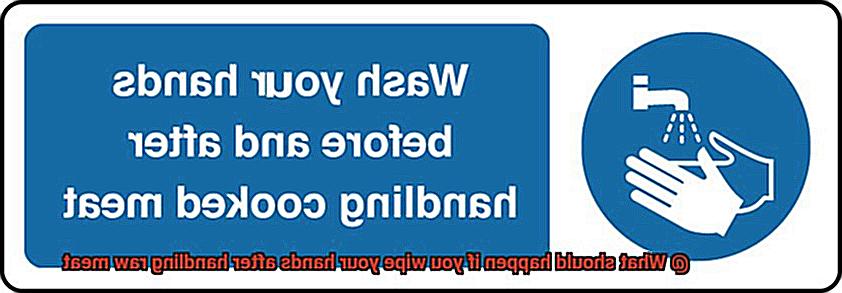
After rinsing, dry your hands with a clean towel or air dry them. Using a dirty towel can reintroduce harmful bacteria onto your hands, so make sure to use a clean towel or air dry them.
Clean Any Surfaces or Utensils That Came Into Contact with Raw Meat
In addition to washing your hands after handling raw meat, it’s important to clean any surfaces or utensils that came into contact with the raw meat to prevent cross-contamination. Hot, soapy water is best for cleaning cutting boards, knives, and countertops. This step will help ensure that harmful bacteria don’t spread to other surfaces.
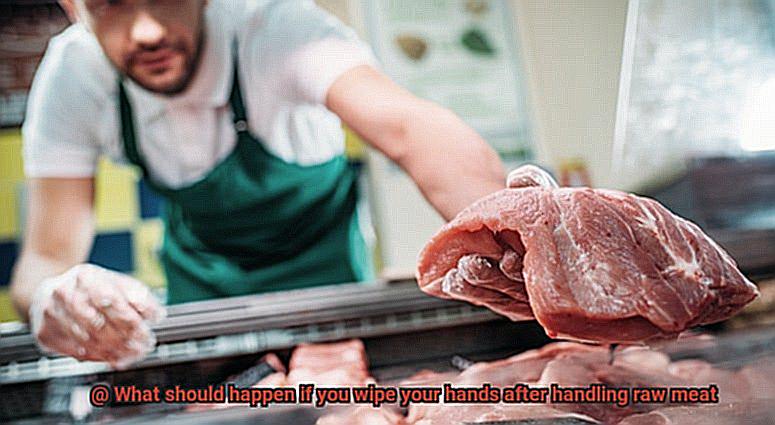
The Risks of Not Properly Wiping and Washing Your Hands After Handling Raw Meat
Whether it’s beef, pork, chicken, or fish, handling raw meat requires utmost care to prevent foodborne illnesses. One of the most important steps in safe meat handling is properly washing and wiping your hands after handling raw meat. Neglecting this crucial step could lead to cross-contamination, a process where harmful bacteria from raw meat can spread to other surfaces, utensils, or even other foods.
Cross-contamination can cause serious health risks, including gastrointestinal illnesses like diarrhea and vomiting, as well as severe infections like salmonella and E. coli. These illnesses can be especially dangerous for young children, pregnant women, and elderly individuals with weakened immune systems. In fact, they can even lead to hospitalization or death.
To prevent cross-contamination and reduce the risk of foodborne illnesses, you must take necessary precautions. Washing your hands thoroughly with soap and warm water for at least 20 seconds after handling raw meat is essential to eliminate any harmful bacteria. Additionally, wiping down any surfaces or utensils that came into contact with the raw meat with a disinfectant solution can also help prevent the spread of bacteria.
It’s worth noting that simply wiping your hands on a towel may not be enough. Even worse, towels can be contaminated with harmful bacteria from the raw meat, which could then spread to other surfaces or hands. Therefore, using disposable paper towels or washing designated hand towels frequently is best to avoid the risk of cross-contamination.
What You Should Avoid When Wiping and Washing Your Hands After Handling Raw Meat
Handling raw meat is crucial to cooking a delicious meal, but it can also pose a danger to your health. Harmful bacteria can easily spread through contact with raw meat, making it essential to take extra precautions when washing and wiping your hands. Here are some things to avoid when washing and wiping your hands after handling raw meat:
- Don’t use a dirty towel or dishcloth: Using a dirty towel or dishcloth to dry your hands after washing them can undo the good work of washing them in the first place. It’s better to use a clean and dry towel or paper towel instead.
- Don’t leave soap residue on your skin: Make sure to rinse your hands thoroughly after using soap. Leaving soap residue can cause skin irritation and encourage the growth of bacteria.
- Avoid using hot water: While hot water may feel like it’s more effective at cleaning, it can actually strip away the natural oils on your skin, causing dryness and irritation. Instead, opt for warm water and soap to clean your hands without damaging your skin.
- Don’t touch anything else before washing your hands: It’s important to avoid touching surfaces or objects after handling raw meat before washing your hands. This includes doorknobs, faucets, and utensils. Wash your hands thoroughly before touching anything else to prevent the spread of harmful bacteria.
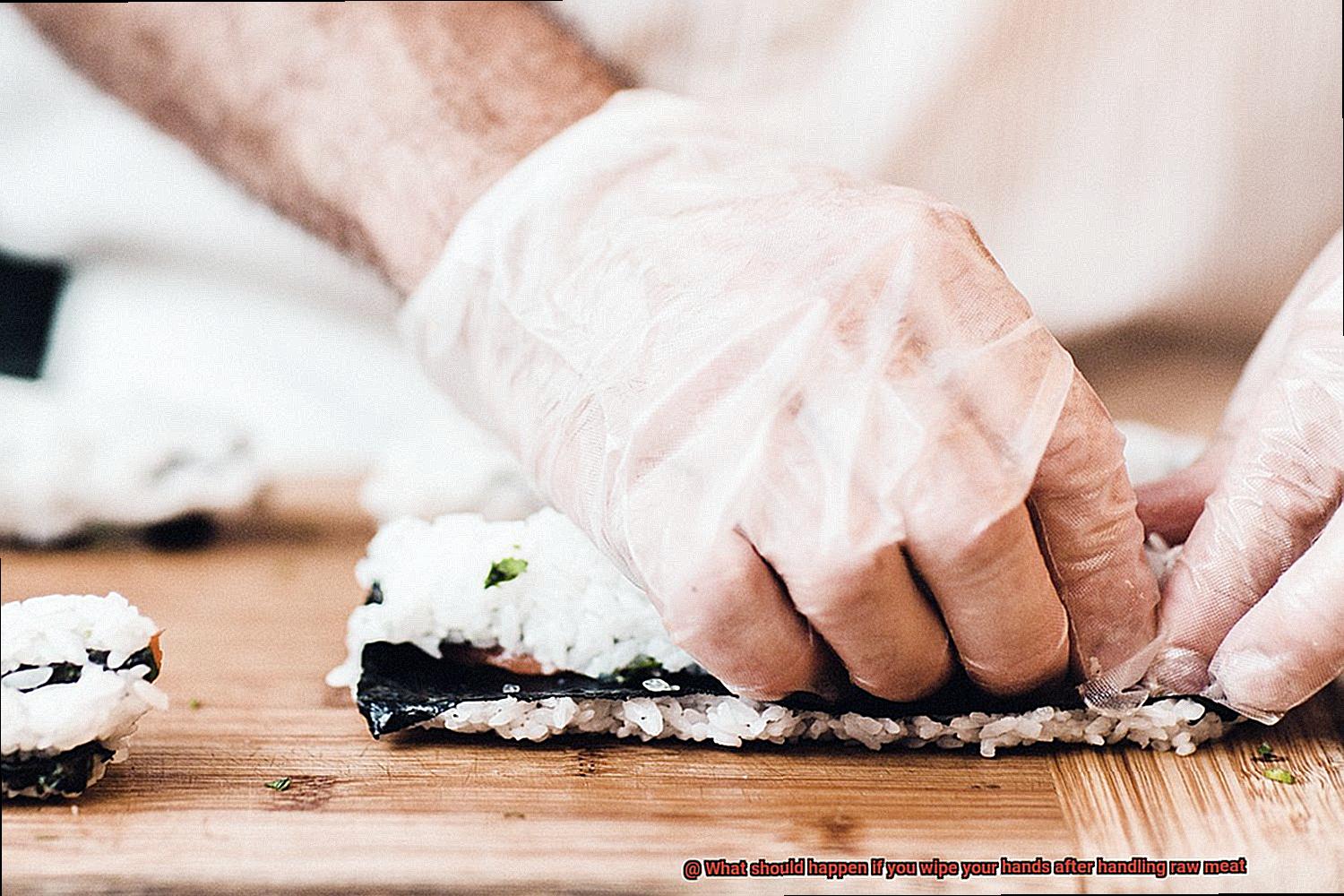
How to Safely Dispose of Used Towels or Paper Towels
Safely disposing of used towels or paper towels is crucial when handling raw meat. Keeping your hands clean and dry is essential in preventing the spread of harmful bacteria. Here are five ways to safely dispose of used towels:
Use a Clean Towel or Paper Towel Every Time
Using a clean towel or paper towel every time you wipe your hands after handling raw meat prevents cross-contamination between different types of meat or other food items. This step ensures that you don’t spread any harmful bacteria onto surfaces or other food items.
Dispose of Used Towels Immediately
Once you have used the towel or paper towel, dispose of it immediately. Leaving it lying around on the kitchen counter or sink can spread bacteria to other surfaces, increasing the risk of contamination. Doing this can also prevent anyone else from accidentally using it.
Use Disposable Paper Towels
Disposable paper towels are a safer option than reusable towels when handling raw meat. They don’t harbor bacteria and, once used, can be thrown away in the trash bin. Make sure to use a trash bag with a tight seal to prevent any bacteria from spreading.
Wash Reusable Towels Thoroughly
If you are using a reusable towel, such as a dishcloth or hand towel, it must be washed thoroughly with hot water and detergent before being used again. This will kill any bacteria that may be present. You can also add bleach to the wash cycle for an extra layer of disinfection.
Don’t Reuse Towels Used for Cleaning Spills or Surfaces That Have Come Into Contact with Raw Meat
Towels used for cleaning up spills or surfaces that have come into contact with raw meat should never be reused without being washed first. This includes dishcloths, sponges, and other cleaning tools. Doing this avoids spreading bacteria onto other surfaces.
P_1tM8inbqU” >
Conclusion
In summary, proper hand hygiene is absolutely crucial when dealing with raw meat. Neglecting to wash your hands can lead to the spread of harmful bacteria and put you at risk for serious foodborne illnesses. While wiping your hands may seem like a quick solution, it actually does more harm than good by spreading bacteria instead of eliminating it.
To properly clean your hands after handling raw meat, you must use soap and water for at least 20 seconds. This ensures that any lingering bacteria is thoroughly removed from your skin. Additionally, it’s important to clean any surfaces or utensils that came into contact with the raw meat using hot, soapy water to prevent cross-contamination.
Failing to observe proper hand hygiene can have severe consequences, including gastrointestinal illnesses and severe infections. To avoid these risks, be sure to follow all guidelines for washing your hands thoroughly after handling raw meat.
Remember: never use dirty towels or dishcloths, leave soap residue on your skin, touch anything else before washing your hands, or reuse towels used for cleaning spills or surfaces that have come into contact with raw meat without being washed first.

